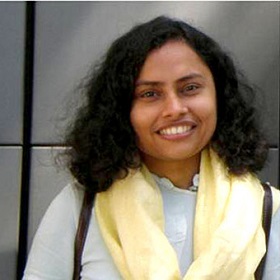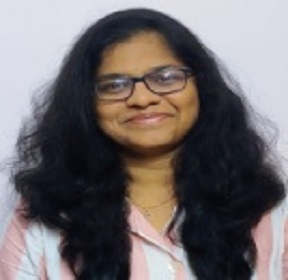Keynote Forum

Reena Rathod
The Julius Maximilians University of Würzburg IndiaTitle: Use of Cell Therapy in solid organ transplantation
Abstract:
The use of adjusted immunosuppressants has significantly improved graft and patient survival in the early phase after transplantation, but long-term results are often inadequate due to the development of chronic transplant rejection. In addition, long-term immunosuppression has serious side effects that can seriously affect a patient`s survival and quality of life. Achieving tolerance in the long term without the use of immunosuppressants is the ultimate goal of most of the research in the field of solid organ transplantation. Several strategies, including perigraft-versus administration of non-hematopoietic immunomodulatory cells, can safely and effectively induce resistance in preclinical models of solid organ transplantation. In my next series of posts, I will be focusing on various evidence of the use of Mesenchymal stem cells in inducing long-term graft tolerance.
Speakers

Samar Mohammed Al-Saggaf
King Abdulaziz University, Saudi Arabia Saudi ArabiaTitle: NR4A1 down-regulated osteoblast differentiation through TGF-ß Pathway and Elesclomol (STA-4783) rescue the phenotype
Abstract:
Regenerative medicine is an emerging new medical discipline that aims at treating chronic, age-related degenerative diseases e.g. diabetes, Parkinson’s disease, osteoporosis, osteoarthritis, using stem cells. A number of stem cells types have been envisaged, as good candidate for therapy and one of the most important type are human Bone Marrow MSCs. Complicated and non-healed fractures represent a major health care problem that not only affecting elderly patients with osteoporosis but also young persons exposed to traumatic injuries due to accidents and in patients with cancers e.g. osteosarcoma or metastatic breast, prostate, thyroid cancers that result in bone destruction. The principle challenge for treating these conditions is to provide a platform enhancing bone regeneration. Regenerative medicine can provide a novel approach for treating these conditions by providing sufficient number of clinical suitable, transplantable bone forming (osteoblastic) cells that can used for therapy. Thus, several approaches have tried to differentiate hBMSCs successfully into osteoblastic cells. Bone formation is a dynamic process that is regulated by many different factors including growth hormones, cytokines, transcription factors, and other molecules. However, human hormone Nuclear receptors (hHNR) are new molecules which has shown to play essential role they are mostly transcription factors with some known and unknown ligands the activators can be steroid hormones, including retinoic acid, Vitamin D, progesterone, and various lipid-soluble signals. In this study we used human Mesenchymal stem cells (hMSCs), that are differentiating highly to bone forming osteoblasts. Human MSCs were differentiated to osteoblasts in the presence of NR4A1 siRNA where after these cells were analyzed by ALP and alizarin red staining and gene-expression. Whole genome microarray was performed on NR4A1 knock down cells and GeneSpring was used for analysis. We used a small molecule called Elesclomol (STA-4783) at the following concentrations (0.01, 0.1, 1 uM) to induce differentiation. We discovered a hHNR called NR4A1 as the highest expressed after human MSC differentiation to osteoblasts by whole genome microarray. Knock out of NR4A1 showed that downregulation of osteoblasts differentiation of hMSCs both in ALPL expression and key marker gene expression. Whole genome microarray analysis further confirmed down-regulation of key pathways when we KD NR4A1. Further studies with small molecule activators, we discovered a novel molecule called Elesclomol (STA-4783), which could activate and enhance osteoblast differentiation. Elesclomol activation of hMSCs also induced the gene expression of NR4A1 and rescue the phonotype of NR4A1 KD. In addition, Elesclomol activated the TGF-ß pathway, by regulating key marker genes. In this study we have discovered the role of human NR4A1 during osteoblast differentiation and that Elesclomol is a positive regulator of NR4A1 through TGF-ß signaling.

Lakshimipriya Sethuram
Vellore Institute of Technology IndiaTitle: Design and Fabrication of eugenol microemulsion based nanotherapeutics – Future perspectives and clinical significance in treating diabetic foot ulcers
Abstract:
Statement of the Problem: Diabetes Mellitus (DM) is an increasingly chronic and execrable disease that has obtained an epidemic proportion worldwide. India carries 25% of a considerable share in the global diabetes burden. Diabetic wounds remain a major health problem and affects approximately 35% of diabetic patients resulting in lower limb amputation with rapid psychosocial and economic costs. The accelerated hyperglycemic environment promotes biofilm formation trending with Antimicrobial resistance (AMR) in chronic wounds. Researchers have designed potential products ranging from saline to skin substitutes for treating chronic wounds. However, it is of great clinical significance to deeply explore on topical application of innovative bioactive materials for the amelioration of effective blood circulation and angiogenic responses to ulcerated wound area. The purpose of this study is to fabricate a nanoscaffold using growth factor impregnated eugenol microemulsion core-sheath nanofibers (CSNs) for treating diabetic wounds in streptozotocin-induced Wistar rats.
Methodology and theoretical orientation: The structural surface and internal morphology, predominant functional groups, crystalline nature, and mechanical characteristics of CSNs have been studied. The antibacterial efficacy of CSNs was evaluated against pathogenic microbial strains. The biosafety cytotoxicity profiles of CSNs have been evaluated. Percentage of wound contraction, quantitative formation of fibroblast, and collagen deposition in streptozotocin-induced diabetic rodent models have been determined.
Findings: The growth factor impregnated CSNs/skin scaffolds exhibited excellent mechanical characteristics and sustained/controlled mode of silver ion release in the simulated wound fluids. The fabricated CSNs demonstrated strong antimicrobial efficacy against susceptible strains and dominant diabetic wound healing efficiency in streptozotocin-induced experimental rodent models.
Conclusion & Significance: Eugenol impregnated nano scaffolds could be the best alternative as potential nanomedicine with excellent anti-inflammatory and anti-proliferative properties for treating diabetic wounds in clinical practice. Regeneration of hair follicles and efficiency of skin recovery modalities is one of the major concerns in the case of non-healing chronic ulcers.
Biography:
Lakshimipriya Sethuram is a Senior research fellow at the Vellore Institute of Technology, India. She received her Senior research fellowship (SRF) from the Council of Scientific and Industrial Research (CSIR), India in 2020. Her research mainly focuses on the design and fabrication of nanomaterials for the treatment of acute and chronic wound healing applications. She is enthusiastic and passionate about exploring new innovations in skin regeneration and tissue engineering approaches (especially in chronic wounds) in order to deal with today's challenges in chronic wound care. She has published her research outcomes in peer-reviewed international scientific journals. Her recent work has been published as a front cover page entitled "A review on contemporary nanomaterial-based therapeutics for the treatment of diabetic foot ulcers (DFUs) with special reference to Indian Scenario" in Nanoscale Advances (Royal Society of Chemistry). She was awarded Research Excellence Award in 2020 from InSC Scholars (International Accurate Certification).


